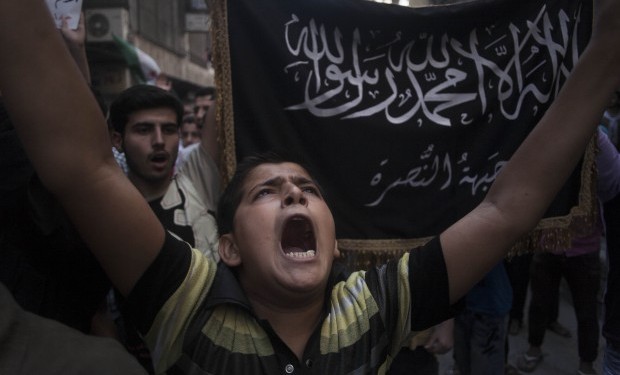A young enthusiastic journalist describes northern Syrian areas as “liberated” zones in her report. She’s surprised that the expression “not under the regime’s control” is a more accurate and more professional. “They are towns liberated of the regime’s injustice,” she said to me.
“The liberated zones” is the expression which Syrian opposition figures have adopted ever since their revolution shifted from a peaceful one towards an armed confrontation with the regime. They use this term with a sense of pride to describe the towns, cities and areas that are no longer under the regime’s control. This expression continued to be used despite all the changes, transformations and chaos occurring on ground. The expression “liberated zones” conveys a longing for getting rid of the tyrannical Assad regime just like the expression “May God curse your soul, Hafez” carried built-up anger.
I still read the expression “liberated zones” in articles and reports on violations committed by some Free Syrian Army brigades and practiced systematically by extremist Islamist brigades. There is currently fierce competition for power between the Al-Nusra Front and the Islamic State of Iraq and Levant in the “liberated” zones.
There are reports stating that a leader from the Islamic State of Iraq proposed to arm and fund poor FSA brigades in exchange for the areas under FSA control. The FSA brigades rejected the proposal, so the leader revealed a belt of explosives wrapped around his waist. The brigades thus immediately accepted the proposal. The Al-Nusra Front is struggling to impose its domination against the expansion of the Islamic State which is considered more extremist. Both of them terrorize citizens. And both of them made more efforts to impose their control than they made efforts to confront the regime. As for the FSA brigades, that’s another story of division.
When reading articles and reports that contain the term “liberated zones,” I began to ponder a lot and pity those who live in these areas. There’s no doubt that confusion over several tragedies is not easy. The areas which are no longer under the regime’s control have also been taken hostage. It’s true that they have been liberated from the Baath Party but they are not free yet. The media’s efforts to distinguish between the FSA brigades and the Al-Nusra Front and the Islamic State is almost non-existent. The picture thus becomes vague for those inside Syria and outside it.
Amidst this chaos, the media’s solution should not resort to the term “liberated” zones.
The situation in zones that are no longer under the regime’s control requires a more accurate description. Is a city that is no longer controlled by the regime and submissive to the fatwas of Al-Nusra Front and the Islamic State “liberated”? Of course not. The Syrian revolution is made up of two confrontations, one with the regime’s battalions and its jets and chemical weapons and another with the Al-Nusra Front and the Islamic State and their fatal fatwas.
The Syrians do not have the option of choosing between the two. Finding a third option has become necessary despite the difficulties. Protests and confrontations in Saraqeb and Aleppo show the search for a third option has begun. Finding another way may be an almost insurmountable task for the Syrian revolution, but it is essential—whoever who kidnapped Father Paolo cannot be anything but a terrorist, just as he who throws barrels of explosives from jets is a criminal.
